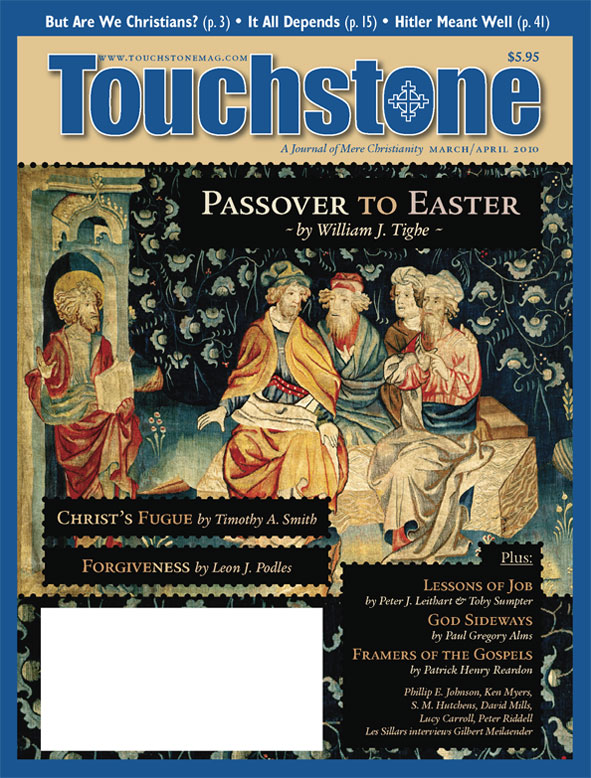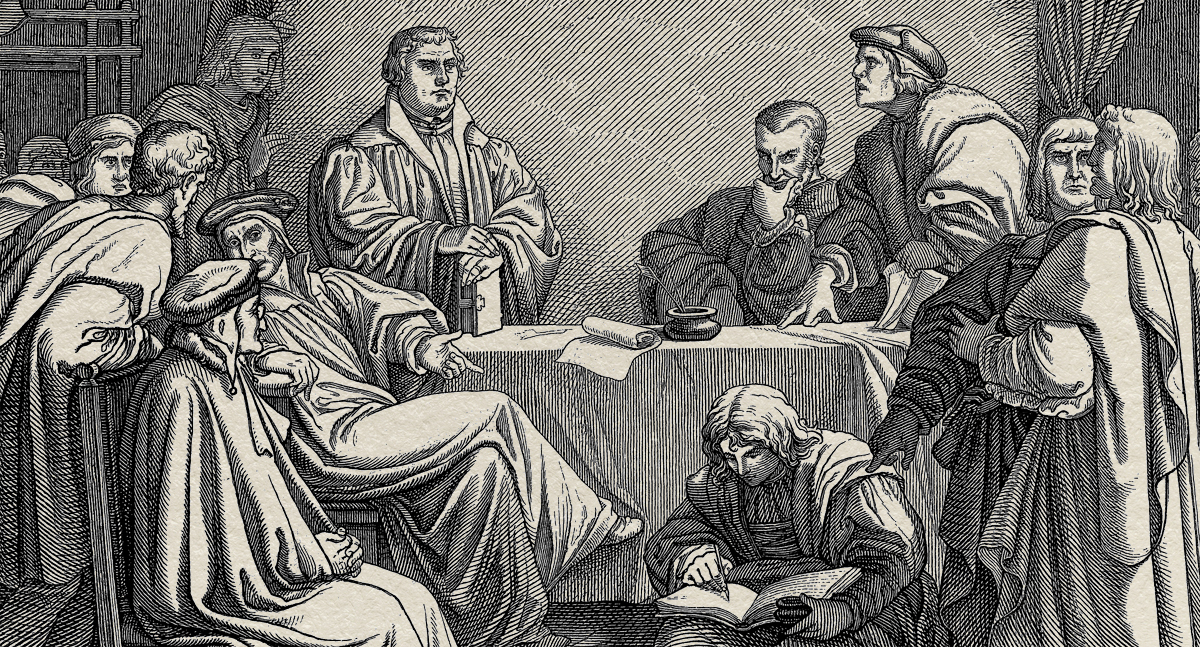It All Depends
Philip Rempel on Randomness & the Providence of God
During my undergraduate days, I started hearing, in the Christian group in which I was involved, the use of the word “random” as an appreciative slang adjective, functioning as a sort of subcategory of “cool.” Meeting a friend unexpectedly, or declaring an unusual hobby or an odd taste in music, might draw an approving, “That’s so random!” I think the phrase was meant, at least semi-consciously, as a joyful response to the wonderful variety and unexpectedness of the world God has made. However, it seems to me that, far from being a Christian response to creation, it is at heart profoundly unchristian, and is evidence of a widespread and unthinking capitulation to the language of secular postmodernism.
All stories involving postmodernism seem to start in the “once upon a time” of the Modern world—and this one is no different. The deficiencies of the Enlightenment worldview are more apparent to us than those of postmodernism because the Enlightenment is further removed from us; and since the postmodern era owes so much to the modern, it is almost always necessary to see the two periods together.
From Clockwork to Chaos
The Enlightenment posited, through its scientific models and its philosophies, a universe of general order and mechanicity. It viewed the world as rigid, and ultimately (though perhaps not practically) predictable. This view naturally suited a period in which science and technology advanced rapidly, but its focus on mechanisms and mathematical models was also a weakness.
A calibrated clockwork cosmos proved extremely useful for discussing Newtonian physics, but it held no mystery, no poetic power, to captivate men’s hearts. The Enlightenment could never be completely convincing to those who were told that all of creation was essentially a lifeless automaton, but who, on stepping outside, found it very much alive.
The twentieth century brought with it Schroedinger and uncertainty theory, and the old theories were updated or replaced with new ones in which ultimate predictability was no longer guaranteed, and often no longer possible. It seems that the world was not best described as a large clockwork.
So the old models were thrown out, and from then until now Western man has been trying to come to terms with a universe whose structure has been removed—and he has done so in an unfortunate way. He has rejected the external governing order and replaced it with internal foundational chaos. The Law has been replaced by the Whim. Whereas in the eighteenth century the universe could be seen as a Machine, it now appears to be a Machine on the fritz.
God Eliminated
And still the new, improved universe lacks plausibility; there is still a discrepancy between what the accepted theory states that the world is like and what we see if we open our eyes and look around. And this is because the new random world is just as dead and dreary as the old mechanical world. It is simply less mechanical.
In discarding modernism, postmoderns missed the fundamental reason the Enlightenment worldview was inadequate. The Enlightenment had reduced the world to a mathematical system, and had, for convenience’s sake, included God in that model and reduced him, too. Or rather, because scientists and philosophers couldn’t figure out how to reduce him, they eliminated him by sending him off into space.
It is ultimately because Enlightenment intellectuals eliminated God that the worldview they espoused was inadequate. They were right that the world evinces considerable order (and the more we discover about the world, the more order we see), but by separating God from creation, they removed the reason and the cause of that order, and so they were forced instead to falsely attribute to the universe an intrinsic order.
Postmoderns made exactly the same mistake, but they started from a different observation. They realized that the universe is wildly unpredictable, but having already forgotten about God, they left no room in their theory for the reason and the cause of that wildness. They thus posited a universe of intrinsic randomness.
Both Structure & Freedom
The problem with both theories is that they assume the universe has intrinsic qualities, that the universe has an existence independent of God. If instead we see the universe through Christian eyes, both the apparent order and the apparent randomness of the world are brought into focus as the free creative expression of a loving God, and our vision is corrected.
For the world we observe if we open our eyes is indeed a universe filled with both structure and freedom, but the structure is never a rigid structure and the freedom is never a lawless freedom. As in a dance, or all art for that matter, where rules and creativity must work in tandem to produce something of meaning, so it is with the universe. In some sense we are part of a cosmic dance, but the dance must be structured if it is to have meaning; a universe of arbitrary motion is just as unsatisfying as a universe without motion.
The existence of every created thing, and thus its role in the dance, is entirely and continually dependent on God, and so our movement through the cosmos and through time, which is our response to his love, must be continually focused on him and directed towards him. Particles and probabilities, and people and planets, are all twirling through the cosmos in response to God’s loving call.
This Christian vision fills the pages of Scripture, from the creation accounts in Genesis to the vision of the new heavens and the new earth in Revelation. From the parting of the Red Sea, to Elijah calling rain from heaven, to Christ calming the storm, Christianity cannot describe the workings of nature as merely “random”—the word is simply too weak, too limited in its meaning.
A Christian should never be able to think of plants as growing or spreading randomly after hearing Christ’s parable of the lilies of the field with its astounding twists and paradoxes—a parable which captures so essentially the beauty and importance and fragility and contingency of all created things. A Christian should never be able to ponder natural disasters without remembering the Fall, or the book of Job, or Christ’s response when the Tower of Siloam fell.
And most of all, a Christian should never be able to describe the creation of man as a process of random mutations and natural selection (even with the word “guided” stuck on as a begrudging and vapid concession to God) without realizing that in saying this he is neglecting the whole beauty and significance of man.
The Language of the Church
To suggest that Christians not be satisfied with describing the world through the terms given to us by science, and instead to use the language and concepts given to us in the Scriptures and in the Christian Church should not be construed as advocating an anti-scientific withdrawal into our “faith community.” The concept of randomness is important and useful in science.
However, as Christians, we must allow the language of the Church, which is fundamentally the language of Scripture, to shape our entire being. Only in doing so can we fully open ourselves to God and proclaim the gospel to a world that desperately needs to hear it. The world needs Christians to proclaim a true alternative to the nature worship and neo-paganism that entices many who are tired of breathing only lifeless, secular air.
And the world especially needs Christians to proclaim the purpose and beauty of every human life. As the current pope has written, “Each of us is willed, each of us is loved, each of us is necessary.” These truths, far more fundamental than the concept of randomness, should be at the heart of the way we see the world. The world is not random—it is the Creation, alive and beautiful, dangerous and frightening; it sings for joy and groans in expectation, sometimes dark and incomprehensible, sometimes bringing us to our knees in wonder—but it is never simply random.
Share this article with non-subscribers:
https://www.touchstonemag.com/archives/article.php?id=23-02-015-v&readcode=2713
subscription options
Order
Print/Online Subscription

Get six issues (one year) of Touchstone PLUS full online access including pdf downloads for only $39.95. That's only $3.34 per month!
Order
Online Only
Subscription

Get a one-year full-access subscription to the Touchstone online archives for only $19.95. That's only $1.66 per month!
bulk subscriptions
Order Touchstone subscriptions in bulk and save $10 per sub! Each subscription includes 6 issues of Touchstone plus full online access to touchstonemag.com—including archives, videos, and pdf downloads of recent issues for only $29.95 each! Great for churches or study groups.
Transactions will be processed on a secure server.
more from the online archives
calling all readers
Please Donate
"There are magazines worth reading but few worth saving . . . Touchstone is just such a magazine."
—Alice von Hildebrand
"Here we do not concede one square millimeter of territory to falsehood, folly, contemporary sentimentality, or fashion. We speak the truth, and let God be our judge. . . . Touchstone is the one committedly Christian conservative journal."
—Anthony Esolen, Touchstone senior editor









